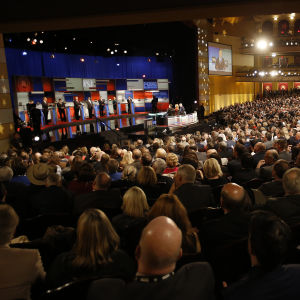When people think about the diversity of the 2016 Republican presidential candidates, the first thing that comes to mind might be demographic characteristics: there’s one woman, one African-American, and three of the candidates speak Spanish fluently. There’s age diversity, too: The youngest is 44, the oldest, 70.
But perhaps the greatest diversity on the political right is in the candidates’ policy ideas. The fourth of the GOP 2016 presidential debates, hosted by Fox Business Network and the Wall Street Journal, was undoubtedly the most policy-focused so far. The wide-ranging discussion of economic and foreign policy issues showcased the intellectual diversity of a big-tent party with various factions and philosophies.
On tax policy, candidates offered a variety of plans: Some candidates, like Ted Cruz, favor a flat income tax paired with a Value-Added Tax. Others, like Jeb Bush or Marco Rubio, reject the VAT and prefer to moderately flatten rates and broaden the tax base.
Some candidates, like Ben Carson, suggest getting rid of “loopholes and deductions,” while others cap or keep some deductions. Whatever your flavor of pro-growth tax reform, someone in the GOP is offering it.
At one point, Rand Paul denounced Marco Rubio’s proposal of a refundable child tax credit, which Paul called “a welfare transfer payment.” Herein lies a clash between Paul’s libertarian outlook and Rubio’s pro-family and politically-palatable plan
Republicans have long branded themselves the party of family values, and acknowledging the rising cost of childcare will resonate with young families, single parents and others outside the traditional GOP base. After all, Rubio’s proposal is fair to all families, unlike the childcare tax credits proposed by President Obama and Democrats, which would benefit only families with two working parents.
But as Paul and other limited-government conservatives might point out, from a pure economic perspective, the best (the least distortionary) tax relief is not the creation of new credits or deductions, but universal reductions in rates.
Another wedge economic issue is free trade. Moderator Gerard Baker asked Donald Trump to defend his protectionist stance against trade deals like the Trans-Pacific Partnership, which launched Trump into a tirade against China and other countries. Trump has also criticized American companies, like Ford Motor Co., for manufacturing cars in Mexico. He proposed to penalize Ford with a 35 percent tax per imported car.
However, all of the other candidates on stage support free trade. This exposes the conflict between protectionist-populist Trump and the rest of the field, who see international free trade as an extension of their free-market philosophies as applied domestically.
But of all the issues, national defense and foreign policy are where conservatives show the widest array of strategies and philosophies. On the more hawkish side, Marco Rubio wants America to be the “strongest military power in the world” and Jeb Bush sees us as “the world’s leader.” Carly Fiorina also believes we should have the “strongest military on the face of the planet.”
In dealing with ISIS, Jeb Bush supports a no-fly zone over Syria. So does Fiorina, who offers a specific foreign policy plan including beefing up the American presence in Poland and the Baltic Sea area, cutting communication with Putin until a time when we are in a position of strength, and sharing intelligence with Middle Eastern allies.
Marco Rubio had one of his best moments of the evening distilling this issue in moral terms. “They hate us because our girls go to school,” he said of terrorists.
Conversely, dovish Rand Paul criticized Rubio’s proposal to increase spending on defense, and called some ideas, like the no-fly zone “naive to the point of being something you might hear in junior high.” Trump, too, said that America shouldn’t provide security for the whole world and linked this issue to the national debt.
On one hand, the intellectual diversity of the political right poses a great challenge. The GOP nominee will have to be someone who can unite the various factions — pro-business, pro-family, pro-opportunity — and ultimately articulate one clear conservative message in the larger contest for the White House.
On the other hand, it is refreshing to watch a real debate centered on ideas, and so many of them. As new House Speaker Paul Ryan said in his inaugural remarks, “We have nothing to fear from honest differences honestly stated.” Let us hope that as iron sharpens iron, so these candidates will sharpen on another, and the best policies can win the day.

